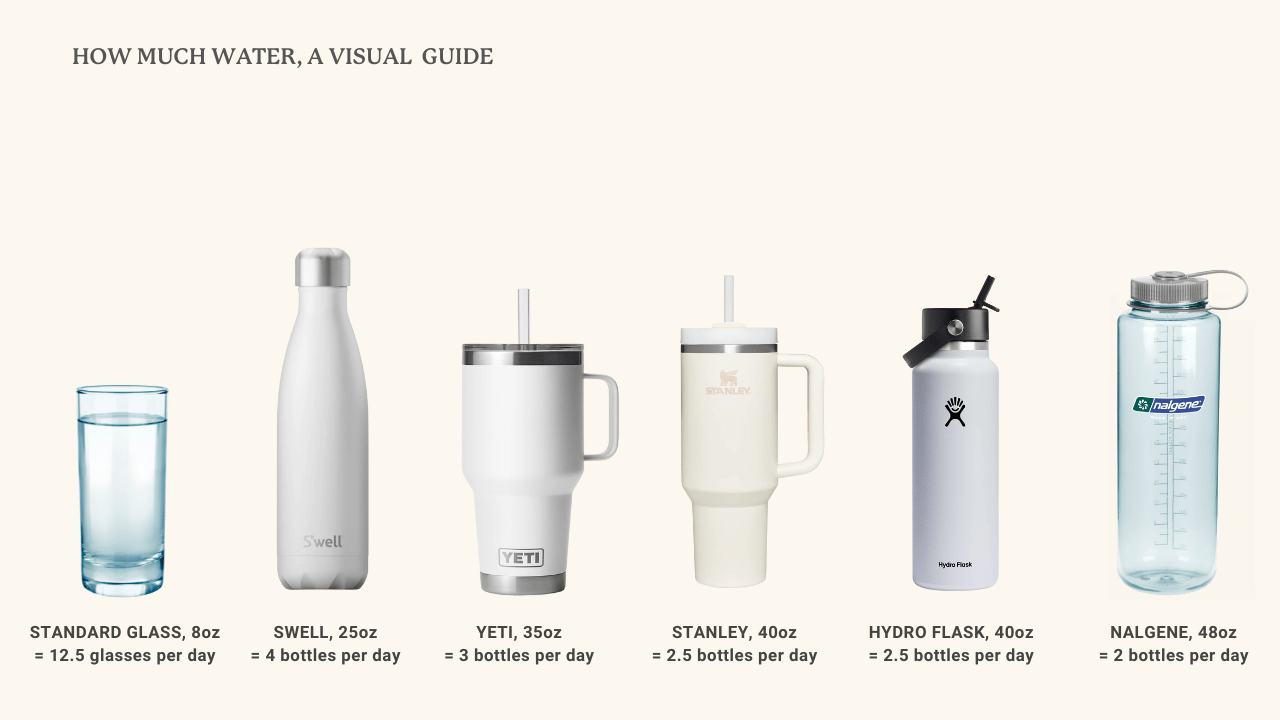How Much Water Should You Really Drink with Gestational Diabetes? (And Why It Actually Matters)

Reviewed by Jamie Askey, RN.
Introduction
When my doctor told me I needed to drink "lots of water" to help manage my gestational diabetes, I nodded along like I knew what that meant. Lots. Sure. Got it. Then I went home and realized I had no idea what "lots" actually looked like in practical terms, or why water mattered for blood sugar in the first place.
Was I supposed to be chugging gallons? Sipping constantly? And honestly, when you're already peeing every 20 minutes and feeling like a water balloon, the idea of drinking even more water sounds almost cruel.
But here's what I've learned: proper hydration during gestational diabetes isn't just about general pregnancy health—it actually plays a direct role in how effectively your body manages blood sugar. The right amount of water can sometimes make the difference between stable readings and frustrating spikes.
The answer to "how much" is more specific than you might expect, and the why behind it is worth understanding.
The Short Answer: 2-4 Liters Daily
Most women with gestational diabetes should aim for 2-4 liters (roughly 8-16 cups or 64-128 ounces) of water per day. Many women find that drinking 3-4 liters daily helps keep glucose levels more stable, with some reporting they drink a pint of water with every meal and one immediately after.
If that sounds like a lot, it is—it's significantly more than most people drink under normal circumstances. But pregnancy isn't normal circumstances, and gestational diabetes adds another layer of fluid needs.

Why Water Actually Matters for Blood Sugar
Here's the part nobody explained to me initially: water isn't just about general hydration when you have gestational diabetes. It specifically helps your body regulate blood sugar by diluting your blood, which makes it easier for your body to manage glucose levels.
Think of it this way: when you're dehydrated, your blood becomes more concentrated, which means the glucose in your bloodstream is also more concentrated. Your body has to work harder to process that glucose and move it into cells where it's needed. Proper hydration dilutes that concentration, making your body's job of managing blood sugar easier.
This doesn't mean drinking water alone will lower blood sugar—that's not how it works. But staying well-hydrated supports your body's natural glucose regulation mechanisms, which can help prevent unnecessary spikes and make your overall management more effective.
(For more on how different factors work together to affect blood sugar levels, see our guide on balancing protein, fat, and carbs with gestational diabetes, The Simple Science Behind Eating Well with Gestational Diabetes: Why Protein, Fat, and Carbs Matter More Than You Think.)
What Your Body Needs Water For (Beyond Blood Sugar)
Pregnancy increases your fluid needs for reasons that have nothing to do with gestational diabetes. Your body needs extra water to:
Form amniotic fluid: Your baby's environment literally depends on adequate hydration
Produce extra blood: Your blood volume increases by about 50% during pregnancy
Build new tissue: Both your growing body and your baby's developing body require water
Transport nutrients: Everything your baby needs reaches them through your bloodstream
Support digestion: Which becomes increasingly challenging as pregnancy progresses
Flush waste: You're eliminating waste for two bodies now
Add gestational diabetes to this list, and adequate hydration becomes even more crucial for blood sugar management and overall metabolic function.
The Hidden Benefits Nobody Mentions
Beyond the obvious glucose regulation support, proper hydration helps with many of the annoying pregnancy symptoms that can feel worse when you're managing gestational diabetes:
Reduced constipation and hemorrhoid risk: Both common complaints that become more likely when you're being careful about fiber and food timing
Decreased swelling: Counterintuitively, drinking more water can actually reduce water retention
Better energy levels: Dehydration causes fatigue, which you don't need more of right now
Softer skin: Helpful as your belly stretches
Lower UTI risk: Urinary tract infections are more common during pregnancy and can affect blood sugar
Reduced preterm labor risk: Dehydration can trigger contractions
Making 2-4 Liters Actually Happen
The biggest challenge isn't understanding why you need water—it's actually consuming that much when you're already feeling waterlogged and spending half your life in the bathroom.
Get a big water bottle: This is non-negotiable. A 1-liter (32oz) bottle means you only need to refill it 2-4 times instead of constantly filling glasses. Having a visual tracker helps you know if you're on pace.
Drink on a schedule: Waiting until you're thirsty means you're already behind. Try: one pint (500ml) with each meal, one immediately after, and one between meals. That's six 16oz servings, getting you to 3 liters.
Add flavor thoughtfully: Plain water all day can feel monotonous. Lemon, lime, cucumber, or frozen berries make it more appealing without affecting blood sugar. Sugar-free flavor drops are generally safe in moderation, but check labels for artificial sweeteners if you're limiting those.
(For more ideas on adding flavor without complicating blood sugar management, check out our guide to condiments and flavor builders that work with gestational diabetes, 40+ Pantry Staples That Make Gestational Diabetes Food Actually Taste Good.)
Front-load your intake: Drinking most of your water earlier in the day means fewer nighttime bathroom trips. Aim for 60-70% of your water intake before dinner.
Link it to blood sugar testing: Develop a habit of drinking water every time you test your blood sugar. Four tests a day, one glass each time, plus meals—you're most of the way there.
What Counts (And What Doesn't)
Counts toward hydration:
- Plain water (obviously)
- Herbal tea (unsweetened)
- Sparkling water
- Milk (though remember the carbs)
Doesn't count:
- Coffee (limit caffeine anyway during pregnancy)
- Regular soda (sugar concern)
- Sweetened tea or coffee drinks
Basically, if it has calories or caffeine, don't count it toward your water goal. Get your hydration from actual water and then consider other beverages as extras.
The Urine Color Test
The simplest way to know if you're adequately hydrated: check your urine color. It should be pale yellow. If it's dark yellow or amber, you need more water. If it's completely clear, you might be overdoing it (yes, that's possible, though uncommon).
This is actually more reliable than thirst, which often lags behind your actual hydration needs, especially during pregnancy when your body's signals can be confusing.
When to Drink Even More
Increase your baseline water intake if:
You live somewhere hot or humid: You're losing more water through sweat
You're exercising: Even gentle pregnancy-safe exercise increases fluid needs
(For information on safe exercise during pregnancy with gestational diabetes (which increases your fluid needs but helps with glucose control), see our guide to gentle movement for gestational diabetes, The Gentle Movement Guide: Safe Exercise for Gestational Diabetes That May Help Lower Blood Sugar.)
You're experiencing vomiting or diarrhea: These can quickly dehydrate you, which affects blood sugar stability
Your urine is consistently dark: Your body is literally telling you it needs more water
The Bathroom Situation
Yes, you will pee more. There's no way around this. Drinking 3-4 liters of water when you're pregnant and your baby is using your bladder as a pillow means frequent bathroom trips.
But here's the thing: you're already peeing frequently. You might as well be properly hydrated while doing it. And many women find that adequate hydration actually improves how they feel overall, making the bathroom trips feel less burdensome because they have more energy and better blood sugar stability.
What About Nighttime?
The nighttime bathroom trips are real, but you can minimize them:
- Drink most of your water before 6 PM
- Take your last big drink 2-3 hours before bed
- Sip minimally in the evening
- Keep a small glass bedside for genuine thirst
You'll still wake up to pee (pregnancy does that regardless), but you won't make it worse by drinking a liter right before bed.
Tracking Your Intake
For the first few weeks, actually track your water intake. Use your phone, a notebook, or one of those water bottles with time markers on the side. Once you develop the habit, you won't need to track as carefully, but initially, most people dramatically overestimate how much water they're actually consuming.
The Bottom Line
Drinking 2-4 liters of water daily with gestational diabetes isn't arbitrary advice—it's based on your body's increased needs during pregnancy plus the specific benefits of hydration for blood sugar regulation. While it won't cure gestational diabetes or replace other management strategies, adequate hydration makes everything else work better.
Start with 2 liters and work your way up to 3-4 based on how you feel and what your urine color tells you. Get a big water bottle, drink on a schedule rather than waiting for thirst, and front-load your intake earlier in the day.
Yes, you'll pee more. But you'll also likely notice better blood sugar stability, more energy, and fewer of the uncomfortable pregnancy symptoms that can make gestational diabetes management feel even more challenging.
Your body is doing profound work right now—growing a human while managing complex metabolic changes. Giving it the water it needs to do that work effectively is one of the simplest, most impactful things you can do.
Where Can I Get More Support?
GD Kitchen! I created this resource to solve a problem I wish someone had already solved before my first GD pregnancy. I teamed up with OB Rachael Sullivan, DO and nutritionist Jamie Askey, RN, so that you'll have all the resources, and all the confidence, I didn't have myself.
Looking for more? Check out the Blog, or try six free recipes here.
What else do we offer? The GD Starter Pack and The Recipe Membership.





